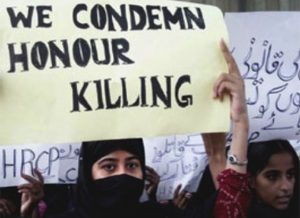Focus on Honor Killings: Jordan
Stephanie Miller
Staff Writer
Despite an initial rejection by the Board of Immigration Appeals, Olga Jad Kamar, under threat of murder by her own family, will be allowed to stay in the United States. The 6th Circuit U.S. Court of Appeals officially ruled in favor of Kamar’s petition against deportation after finding “substantial evidence” that, if she were forcibly returned to Jordan, she would be killed by cousins.
The threat of “intending to perform an honor killing,” in accordance with the Jordanian cultural custom against pre-marital pregnancy, was the basis for the court’s ruling.
Despite being considered the most progressive Arab nation in the Middle East, Jordan maintains one of the highest rates of honor crimes in the world, reports Human Rights Watch. In 2013, researchers at Cambridge University’s Institute of Criminology found that of the 850 students surveyed, almost half of boys and one in five girls interviewed believe that killing a daughter, sister, or wife who has “dishonoured” or shamed the family, is justified, reports Al Jazeera.
Jordan averages out at about 20 deaths per year, according to Human Rights Watch, but this number is rising. Over 36 “justified” honor killings were reported by the Jordanian government in 2017; the rate of change comes out at an 89% increase from the 19 deaths reported in 2002.
However, there is a distinct discrepancy between the numbers that the government reports and the findings of NGOs. The Sisterhood is Global Institute in Amman found that honor crimes rose by 60% since 2016, and there are no signs of that rate slowing down.
Protections for at-risk women remain limited. The Fair Observer reports that “the state puts women who are at risk of honor crimes into ‘protective custody,’ which often means prison without charge.” 65% of all 1,700 incarcerated women in Jordan are detained “indefinitely” for this reason, with limited options.
Reuters interviewed one woman with the alias “Fatima,” whose father attempted to kill her and her sister after he found out her sister was pregnant out of wedlock. She was rescued by neighbors and placed in the custody of the local police; her sister died.
Fatima was subsequently imprisoned for her own protection, and was not released for over 22 years. While there, she experience frequent and heavy abuse by her fellow inmates. “When I went inside and they put me in cells with murderers, narcotics, thieves and prostitutes, I no longer knew who I was and what I am,” she said.
Adam Coogle, a Middle East researcher at Human Rights Watch, confirms that “A woman who is held for her own protection is in the same cell with a convicted murder or someone who has actually committed an act of violence. This can lead to a lot of psychological problems and real fear,” reports Reuters.
According to Reuters, alternatives to imprisonment include voluntary release and arranged marriage, but neither option is ideal. Women who are granted release must have a male family member act as a guardian, but these relatives are more often than not the same ones that threatened the women’s lives to begin with.
Arranged marriage is almost impossible, and there is no guarantee of safety. Twenty-six-year-old Swason, also an alias, spent two years in a Jwaideh detention facility before a man arrived to determine if she was suitable for marriage
“The very next day I was transferred to the governor’s office and the governor signed my marriage certificate,” she reported. Now four years later, she is looking to escape this very arrangement, as her husband is an abusive alcoholic.



